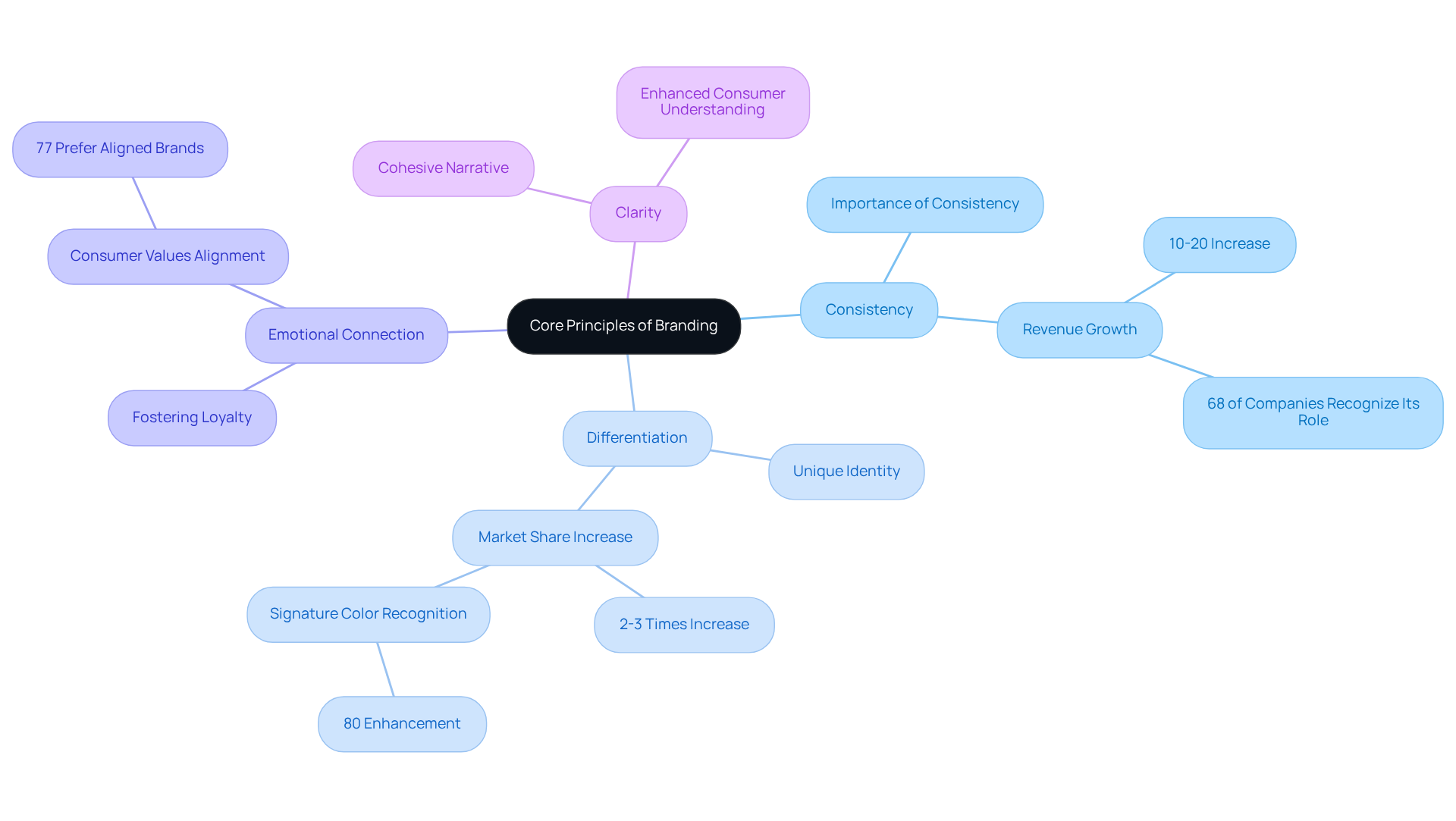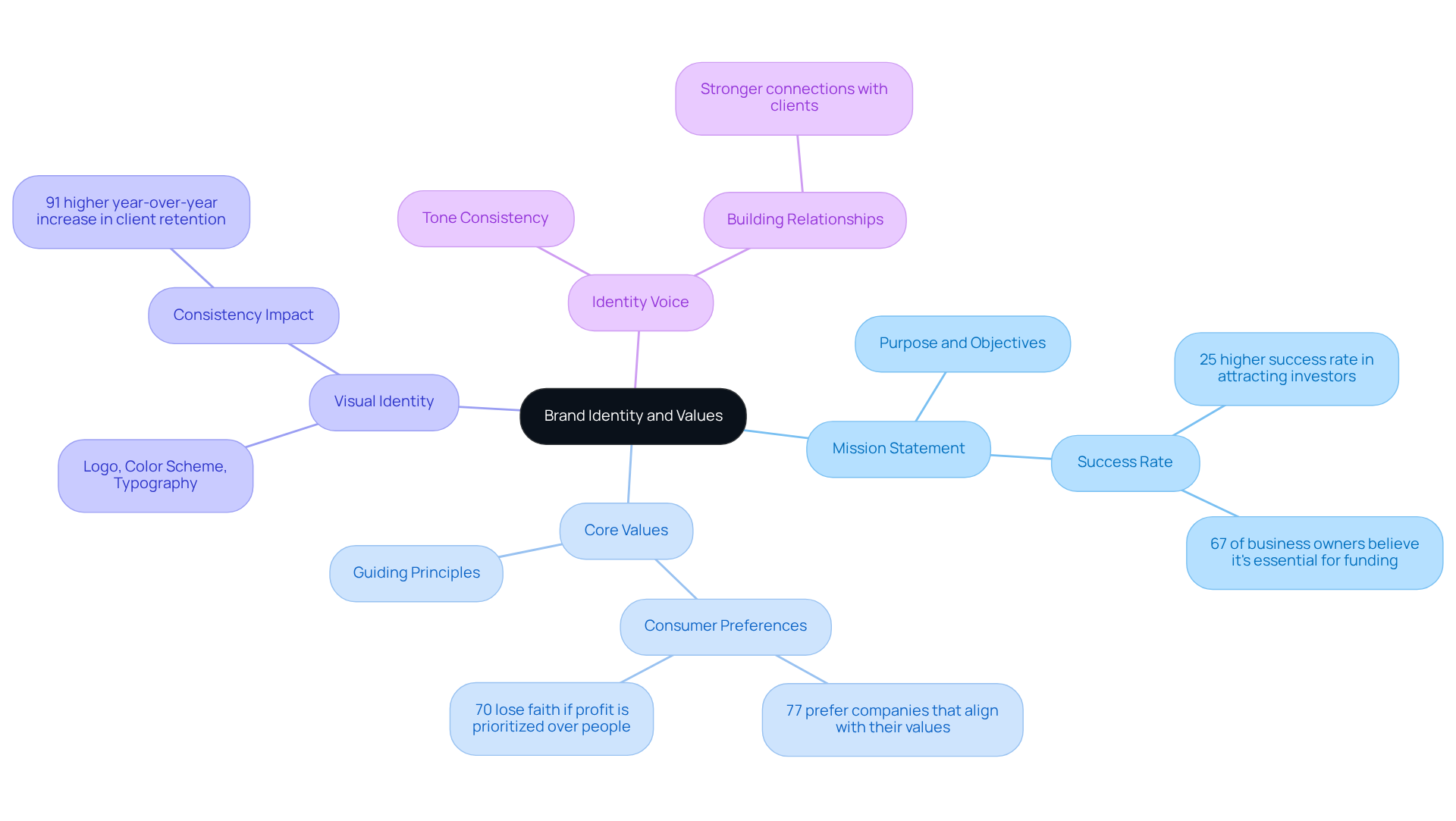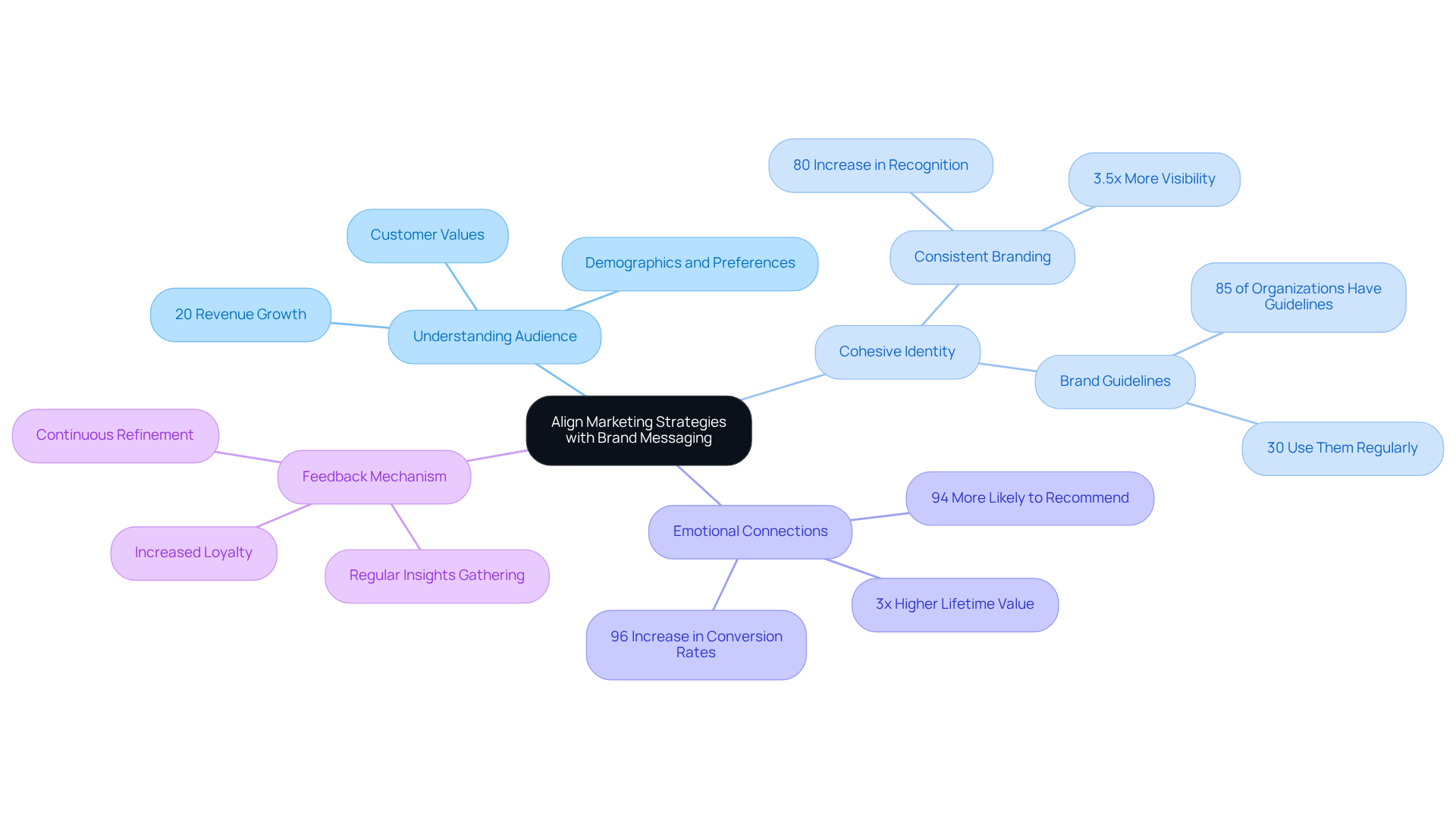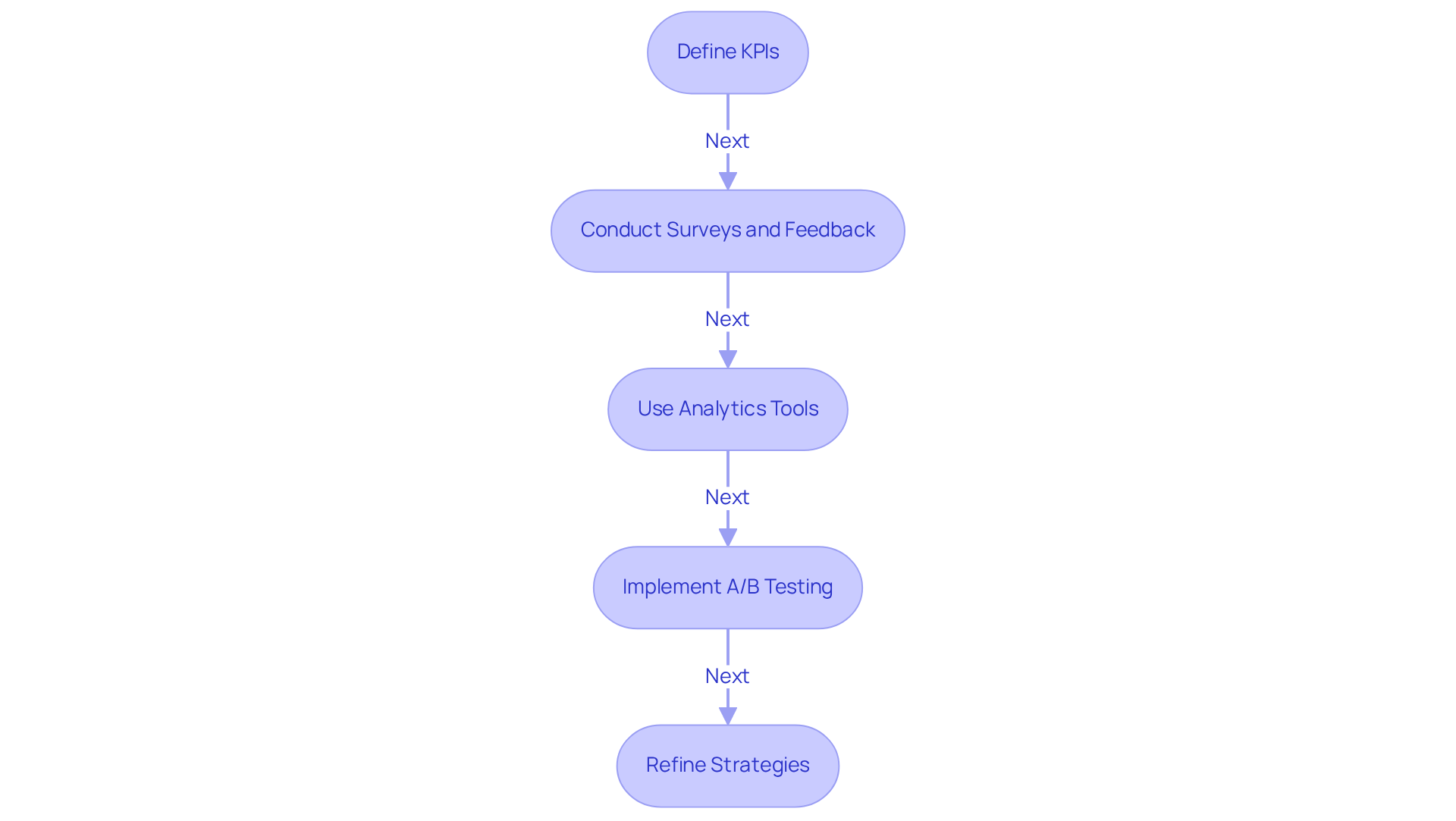Overview
The article highlights a common challenge faced by startups: establishing a strong brand identity amidst fierce competition. Many founders struggle with this, feeling overwhelmed by the need to stand out while remaining consistent. This uncertainty can lead to frustration and doubt about their brand's potential. However, there is hope. The article outlines four essential branding strategies that can help startups thrive:
- Consistency
- Differentiation
- Emotional connection
- Clarity
These strategies are not just theoretical; research shows that maintaining a consistent brand message can significantly boost revenue. Moreover, fostering emotional connections with consumers can enhance loyalty and strengthen market presence. By embracing these strategies, startup founders can create a nurturing and supportive brand that resonates with their audience. Remember, you are not alone in this journey. Many have walked this path and found success by implementing these very principles. Together, we can build brands that not only succeed but also connect deeply with the people they serve.
Introduction
In a world where startups are constantly striving for recognition, the importance of a strong branding strategy is truly profound. Many founders find themselves facing a daunting challenge—not merely in designing a logo or a catchy tagline, but in developing a holistic brand identity that truly resonates with their intended audience. This article explores four vital branding strategies that can empower startups to cultivate a robust market presence, nurture customer loyalty, and ultimately drive sustainable growth.
How can emerging businesses navigate the intricate landscape of branding to ensure they shine in an increasingly competitive arena? By delving into these strategies, we may uncover the essential keys to unlocking their full potential.
Understand the Core Principles of Branding
Branding goes beyond just logos or catchy taglines; it represents the entire perception of a company in the eyes of its customers. Many tech startup founders face the challenge of establishing a strong brand identity, which can often feel overwhelming. This struggle can lead to confusion and missed opportunities in a competitive market.
-
Consistency is essential. Maintaining a uniform message across all platforms builds trust and recognition. It’s heartening to know that statistics indicate consistency in branding can result in revenue growth of 10-20%. In fact, 68% of companies recognize its vital role in expansion. Imagine the relief of knowing that a consistent approach can pave the way for growth.
-
Differentiation is equally important. Clearly defining what makes your identity unique is crucial for standing out in a crowded marketplace. Companies with well-defined marketing strategies can expect revenue growth of 10-20% and a 2-3 times increase in market share. Moreover, using a signature color can enhance identity recognition by 80%, underscoring the importance of visual branding elements.
-
Emotional connection is what truly fosters loyalty. Successful companies create bonds with their audience, which leads to advocacy. Studies reveal that 77% of shoppers prefer to buy from companies that align with their values. This highlights the importance of messaging that resonates with consumer beliefs, a comforting thought for founders seeking genuine connections.
-
Clarity in conveying your organization’s mission and principles is crucial for effective engagement. A cohesive narrative not only enhances consumer understanding but also strengthens loyalty.
Consider a tech startup that communicates its mission and values effectively while maintaining a consistent message. Such an approach can significantly boost customer loyalty and market share. By embracing these principles, tech startups can build a solid foundation for their branding strategies, ensuring they resonate with their target audience and effectively stand out in the marketplace. Remember, you’re not alone in this journey; understanding these elements can empower you to create a meaningful brand that truly connects.

Define Your Brand Identity and Values
Defining your identity and values can feel overwhelming, yet it is crucial for establishing a strong market presence through effective branding strategies in marketing. Many startup founders grapple with this challenge, often feeling lost in the intricacies of articulating their vision. This struggle can lead to uncertainty, making it difficult to attract the right investors and customers. However, by following a few key steps, you can navigate this journey with confidence and clarity.
Mission Statement: Start by clearly articulating your startup's purpose and objectives. A well-defined mission statement conveys your company's intent and can significantly improve your chances of obtaining funding. In fact, startups with clear missions enjoy a 25% higher success rate in attracting investors. Moreover, 67% of business owners believe that a concise mission statement is essential for securing funding. This clarity not only helps you but also resonates with those who share your branding strategies in marketing.
Core Values: Next, identify the principles that guide your business decisions and customer interactions. These values should genuinely reflect your organization's character and ethics. Research shows that 77% of consumers prefer companies that align with their values, and 70% will lose faith in a company that prioritizes profit over people. Your core values serve as a guiding beacon, helping you make branding strategies in marketing that resonate with both your team and your customers.
Creating a unified visual identity is also essential for effective branding strategies in marketing. This includes developing a logo, color scheme, and typography that encapsulate your essence. Consistency in these elements across all platforms is vital; companies that adopt branding strategies in marketing with clearly defined visual identities see a 91% higher year-over-year increase in client retention. Imagine how reassuring it is for your customers to recognize your brand at every touchpoint.
Identity Voice: Establishing a tone of voice that aligns with your identity is equally important. This voice should be reflected consistently in all communications, from marketing materials to client service interactions. Branding strategies in marketing create a powerful identity that fosters stronger relationships with clients, enhancing loyalty and engagement. As Chelsea D'Angelo wisely states, "Possessing robust principles assists companies in numerous ways — especially regarding their connection with customers and staff."
By thoughtfully outlining these components and avoiding common pitfalls—like failing to ensure that your principles are practical and memorable—you can create an engaging and distinctive identity that resonates with your intended audience. This thoughtful approach not only fosters growth and achievement but also cultivates a sense of community and support within the startup ecosystem.

Align Marketing Strategies with Brand Messaging
To effectively align your branding strategies in marketing with brand messaging, it’s crucial to recognize the challenges that many face in this endeavor. Misalignment can lead to confusion and missed opportunities, leaving your audience feeling disconnected. Understanding your customers' demographics, preferences, and values is essential. By customizing your messaging to connect with their particular needs, you can foster a deeper relationship. Companies that emphasize audience insights have reported up to a 20% revenue growth, and 68% of businesses note a 10-20% growth linked to brand consistency. This highlights the significance of truly knowing your audience for successful marketing.
Maintaining a cohesive identity across all marketing channels is another vital aspect. When your messaging is consistent, it not only enhances recognition but also builds trust. Studies indicate that companies with a uniform presentation are 3.5 times more visible in competitive markets. Moreover, consistent branding can increase recognition by up to 80%, translating into greater customer loyalty and engagement.
As you develop your content strategy, consider highlighting your unique selling propositions while captivating your audience through storytelling. Emotional connections can be incredibly powerful; companies that effectively utilize storytelling have seen a remarkable 96% increase in conversion rates. This underscores the importance of resonating with your audience on a personal level, making them feel valued and understood.
Establishing a regular feedback mechanism is essential for gathering insights from your audience. This practice ensures that your messaging remains relevant and impactful, allowing for continuous refinement. Companies that adapt according to consumer insights often see significant improvements in their market presence and client satisfaction, leading to increased loyalty.
By aligning your branding strategies in marketing with messaging, startups can create a cohesive experience that enhances loyalty and drives sustainable growth. Remember, you’re not alone in this journey; together, we can navigate these challenges and create meaningful connections with your audience.

Measure and Optimize Your Branding Efforts
To effectively measure and optimize your branding strategies in marketing, it’s essential to acknowledge the challenges that many startups face in establishing their identity. The pressure to stand out in a competitive market can be daunting, often leading to feelings of uncertainty and overwhelm. However, by embracing branding strategies in marketing, you can navigate these challenges with confidence.
Key Performance Indicators (KPIs): Start by defining KPIs that resonate with your identity objectives. Metrics like awareness, customer engagement, and conversion rates are vital. Research indicates that 84% of B2B marketers prioritize awareness of their products, underscoring its importance for startups. Furthermore, 46% of U.S. consumers are willing to invest more in brands they trust, highlighting how crucial it is to cultivate that trust through branding strategies in marketing.
Surveys and Feedback: Engaging in consumer perception surveys can provide invaluable insights into how your company is viewed. This feedback not only helps identify your strengths but also reveals areas for improvement. Significantly, 66% of consumers report feeling more connected to brands that foster a sense of community. Understanding customer sentiment is key to nurturing connections and effectively implementing branding strategies in marketing.
Analytics Tools: Consider leveraging analytics platforms to monitor metrics like website traffic and social media engagement. Analyzing this data allows you to assess the impact of your marketing initiatives. For instance, companies that maintain consistent messaging can see revenue growth of 10% to 20%, reinforcing the financial benefits of a unified identity.
A/B Testing: Implement A/B testing on various promotional elements, such as messaging and visuals, to discover what resonates most with your audience. Emotional content, for example, performs twice as effectively as non-emotional content, emphasizing the importance of strategic experimentation. Additionally, 85% of purchasers believe that colors enhance brand visibility and influence buying decisions, illustrating the profound effect of visual identity on consumer perception.
By consistently measuring and refining your branding strategies in marketing, you can adapt to market dynamics and enhance your relevance and effectiveness. As Krunal Vaghasiya wisely notes, aligning branding strategies in marketing with customer values can drive revenue. This alignment is essential for startups, and focusing on these aspects can pave the way for success. Remember, you are not alone in this journey; many have walked this path and found their way through strategic branding.

Conclusion
Establishing a strong brand identity can feel daunting for startups trying to thrive in a competitive marketplace. It’s important to recognize that branding involves much more than just visual elements; it’s about how your company is perceived by its customers. By focusing on key principles such as:
- Consistency
- Differentiation
- Emotional connection
- Clarity
you can create a solid foundation for your branding strategies. This ensures that you resonate with your target audience and stand out effectively.
Throughout this journey, essential strategies come into play. Defining a clear mission statement and core values is crucial, as is aligning your marketing efforts with your brand messaging. Continuously measuring and optimizing your branding initiatives can foster customer loyalty, enhance your market presence, and drive growth. The statistics shared remind us that a well-executed branding strategy can lead to significant revenue increases and a deeper connection with consumers.
Ultimately, the significance of effective branding strategies cannot be overstated. Embracing these principles enables you to cultivate a meaningful brand that resonates with your audience and stands the test of time. By integrating these insights into your branding efforts, you can navigate the complexities of the market with confidence, transforming your vision into a compelling identity that attracts customers and investors alike. The journey may be challenging, but with a thoughtful approach to branding, success is within reach.
Frequently Asked Questions
What is the definition of branding?
Branding represents the entire perception of a company in the eyes of its customers, going beyond just logos or catchy taglines.
Why is consistency important in branding?
Consistency is essential because it builds trust and recognition. Statistics indicate that consistent branding can lead to revenue growth of 10-20%, and 68% of companies recognize its vital role in expansion.
How does differentiation impact a company's branding?
Differentiation is crucial for standing out in a crowded marketplace. Companies with well-defined marketing strategies can expect revenue growth of 10-20% and a 2-3 times increase in market share.
What role does emotional connection play in branding?
Emotional connection fosters loyalty. Successful companies create bonds with their audience, leading to advocacy, as 77% of shoppers prefer to buy from companies that align with their values.
How important is clarity in conveying a company's mission and principles?
Clarity is crucial for effective engagement. A cohesive narrative enhances consumer understanding and strengthens loyalty.
What can tech startups do to improve their branding strategies?
Tech startups should communicate their mission and values effectively while maintaining a consistent message to boost customer loyalty and market share.
What are some key elements for building a strong brand identity?
Key elements include consistency, differentiation, emotional connection, and clarity in messaging, all of which help create a meaningful brand that resonates with the target audience.




